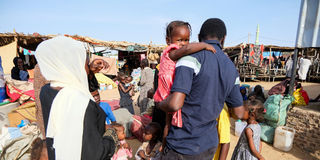
Al-Rasheed Al-Tahir, a displaced Sudanese man who is reunited with his sisters, nephews and nieces, walks and carries the children of his sister who was killed in the war-torn al-Fashir city, as the humanitarian situation deteriorates amid the ongoing conflict between the paramilitary Rapid Support Forces (RSF) and the Sudanese army, at a displacement camp in Al Dabba, Sudan, September 6, 2025.
A coalition of prominent African and international peace watchers says a sustainable solution in Sudan’s conflict can only be achieved by placing civilians at the centre of the political process. They emphasised that the Sudanese army is not—and cannot be—the solution to the country’s protracted conflict, even though it has portrayed itself as the people’s saviour against the Rapid Support Forces (RSF).
At a panel discussion in Nairobi, the diplomats accused the army of obstructing genuine peace efforts and repeatedly pushing for a military resolution, despite consistently boycotting negotiations led by international bodies.
Earlier this year, the Sudanese army snubbed talks held in Geneva, following its previous boycotts of negotiation attempts in Manama and Jeddah in 2023, pushed by the United States and Saudi Arabia as mediators.
Now, with the war in its third year and having caused more than 45,000 deaths and the displacement of 12 million people, experts say that neither the army nor the RSF has a political solution for Sudan — something the country desperately needs.
The group, comprising notable African and foreign diplomats, warned that the Sudanese army is veering toward extremism and is already involved in arms trafficking with countries such as Pakistan, Turkey, and Iran.
Some independent analysts have already published imagery of drones and missiles manufactured by these countries, although the actual entity that delivered them to the warfront is debated.
Kenya’s former Foreign Affairs Cabinet Secretary Amina Mohamed said the international community must apply more pressure on the warring sides.
“The international community should act decisively. The UN, the AU, and the EU—and in particular the US—should take urgent, coordinated measures to pressure both sides into an immediate ceasefire and force a return to negotiations.
“Without such interventions, Sudan’s crisis will only worsen—and the world will bear the shame of its indifference,” the group later said in a joint statement after meeting at the Kempinski Hotel.
Both the army and RSF have been accused of war crimes, crimes against humanity and genocide, and the US and UK governments have placed sanctions on lieutenants and entities linked to the two sides.
Participants at the Thursday panel discussion included former Sudanese Foreign Minister Khalid Omer; Twabia Jomo, representative of the United Nations Office for the Coordination of Humanitarian Affairs; and former foreign ministers Amina Mohamed (Kenya) and Mongi Hamdi (Tunisia).
Key political figures such as Democratic Alliance ‘Somaud’ spokesperson Bakri Al-Jak, Secretary General Siddiq Al-Sadiq Al-Mahdi, and General Secretariat member Khaled Omar were also in attendance.
The summit, convened by the Kofi Annan Foundation and Amina Live Foundation, attracted diplomatic officials from Kenya, Botswana, Mali, Mozambique, Canada, and the United States.
The former Tunisian minister Hamdi emphasised the urgent need for a “civilian-focused peace agreement that would culminate in an interim government led by civilians and eventually hold elections to chart the way forward for democracy after restoring peace.”
He noted that regional stability is at risk of collapsing into a full-blown crisis, exacerbated by the Sudanese army fighting alongside militias, including armed groups from Tigray.
The group issued a joint declaration warning of the possibility that radical Islamist groups such as ISIS and others from Mali, Iraq, Syria, among others, “will come to Sudan because it is an ideal hiding place for them.”
“This war cannot be allowed to persist. Neither side can achieve military victory. The longer it continues, the greater the suffering and the risk of regional destabilisation. Sudan borders fragile states that could be drawn into the conflict, leading to a broader humanitarian and security crisis across the region,” they said.
While acknowledging the critical role of regional and international organisations—including the East African Community (EAC), the Intergovernmental Authority on Development (IGAD), the African Union (AU), the European Union (EU), and the United Nations (UN)—the leaders criticised some of these bodies for enabling the war by “taking sides.”
While external players like the United Arab Emirates have faced accusations of interfering, the experts said the war itself predates UAE involvement.
“Even when the war was building up, many Sudanese expected it to happen. There is a regional coalition supporting SAF and a regional coalition supporting RSF. They say they do not want war in Sudan, yet weapons are flying all over.”
“Sudan has been fighting since 1955—before the UAE. This fighting is a Sudanese issue.”
According to former Sudanese Foreign Affairs Minister Omer, international organisations “instead of engaging constructively, took sides by supporting Sudanese army general and de facto leader Abdel Fattah al-Burhan.”
Sumaud has tried to offer an alternative third track but has failed to prevail upon either side of the conflict. In fact, a splinter group of Sumaud joined RSF earlier in May, signalling a clash of ideologies. Sumaud is led by political and civil leaders, led by former Prime Minister Abdalla Hamdok.
They reject military solutions but have faced resistance from the armed forces, who want to play a key role in politics. In fact, Hamdok was ousted in October 2021 when the armed forces and RSF worked on one side against him.
Bakri Al-Jak, Sumaud’s spokesperson, stated that while the Sudanese people “want the war to stop,” the state—acting through the army, intelligence forces, and Ministry of Foreign Affairs—has been determined to obstruct peace efforts and block the establishment of a civilian government at all costs.
He described attempts to resolve the conflict through military means as illogical, warning that they would only trigger a new wave of hostilities.



